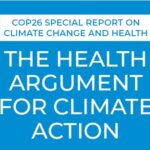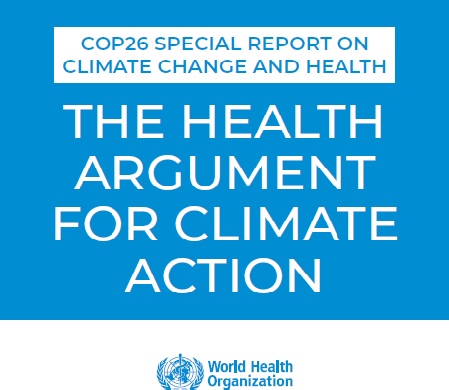
Taking rapid and ambitious action to halt and reverse the climate crisis has the potential to bring many benefits, including for health, according to the COP26 Special Report on Climate Change and Health report by the World Health Organisation.
The Health Argument for Climate Action report identifies co-benefits as defined as: the positive effects that a policy or measure aimed at one objective might have on other objectives, thereby increasing the total benefits for society or the environment.
The health impacts of climate change Climate change is the single biggest health threat facing humanity, and health professionals worldwide are already responding to the health harms caused by this unfolding crisis.
While no one is safe from these risks, the people whose health is being harmed first and worst by the climate crisis are the people who contribute least to its causes, and who are least able to protect themselves and their families against it – people in low-income and disadvantaged countries and communities.
The climate crisis threatens to undo the last fifty years of progress in development, global health, and poverty reduction, and to further widen existing health inequalities between and within populations.
It severely jeopardises the realisation of universal health coverage (UHC) in various ways – including by compounding the existing burden of disease and by exacerbating existing barriers to accessing health services, often at the times when they are most needed. Over 930 million people – around 12% of the world’s population – spend at least 10% of their household budget to pay for health care.
With the poorest people largely uninsured, health shocks and stresses already currently push around 100 million people into poverty every year, with the impacts of climate change worsening this trend. Climate change is already impacting health in a myriad of ways, including by leading to death and illness from increasingly frequent extreme weather events, such as heatwaves, storms and floods, the disruption of food systems, increases in zoonoses and food-, water- and vector-borne diseases, and mental health issues. Furthermore, climate change is undermining many of the social determinants for good health, such as livelihoods, equality and access to health care and social support structure.
The public health benefits resulting from ambitious mitigation efforts would far outweigh their cost. Strengthening resilience and building adaptive capacity to climate change, on the other hand, can also lead to health benefits by protecting vulnerable populations from disease outbreaks and weather-related disasters, by reducing health costs and by promoting social equity. The health co-benefits from climate change actions are well evidenced, offer strong arguments for transformative change, and can be gained across many sectors, including in energy generation, transport, food and agriculture, housing and buildings, industry, and waste management.
For example, many of the same actions that reduce greenhouse gas emissions also improve air quality, and support synergies with many of the Sustainable Development Goals (SDGs). Some measures – such as facilitating walking and cycling – improve health through increased physical activity, resulting in reductions in respiratory diseases, cardiovascular diseases, some cancers, diabetes and obesity.
Another example is the promotion of urban green spaces, which facilitate climate mitigation and adaptation while also offering health co-benefits, such as reduced exposure to air pollution, local cooling effects, stress relief, and increased recreational space for social interaction and physical activity. A shift to more nutritious plant-based diets in line with WHO recommendations, as a third example, could reduce global emissions significantly, ensure a more resilient food system, and avoid up to 5.1 million diet-related deaths a year by 2050.
Research has shown that climate action aligned with Paris Agreement targets would save millions of lives due to improvements in air quality, diet and physical activity, among other benefits. However, many climate decision-making processes currently do not account for health co-benefits and their economic valuation.
The 2021 WHO Health and Climate Change Global Survey of governments found that less than 1 in 5 countries have conducted an assessment of the health co-benefits of national climate mitigation policies, while a 2021 WHO review of Nationally Determined Contributions (NDCs) found just 13% of current NDCs commit to quantifying or monitoring the health co-benefits of climate policies or targets.
While there are significant health co-bene-fits available for various climate interventions, which can act as important ethical and economic incentives, some climate mitigation and adaptation policies may not maximise health gains or may potentially cause harm. Additionally, several challenges and barriers remain for the comprehensive inclusion of health in the cost assessment of climate policies.
It is therefore critical that health and other experts are fully involved in climate decision-making processes at all levels, to ensure health and equity considerations are well understood and accounted for when developing climate policies.









